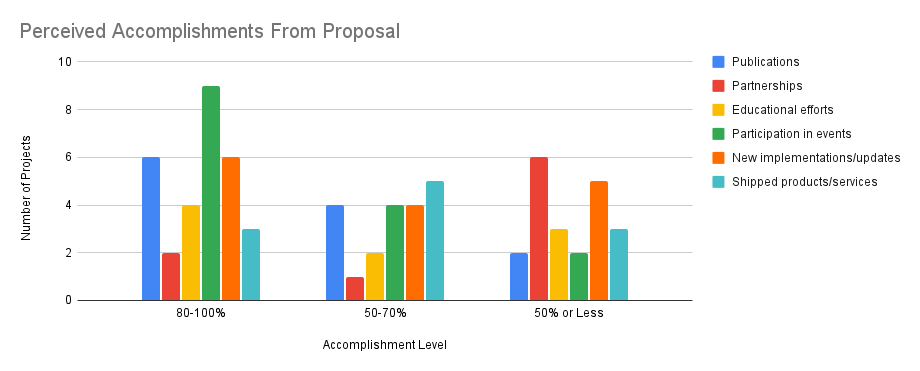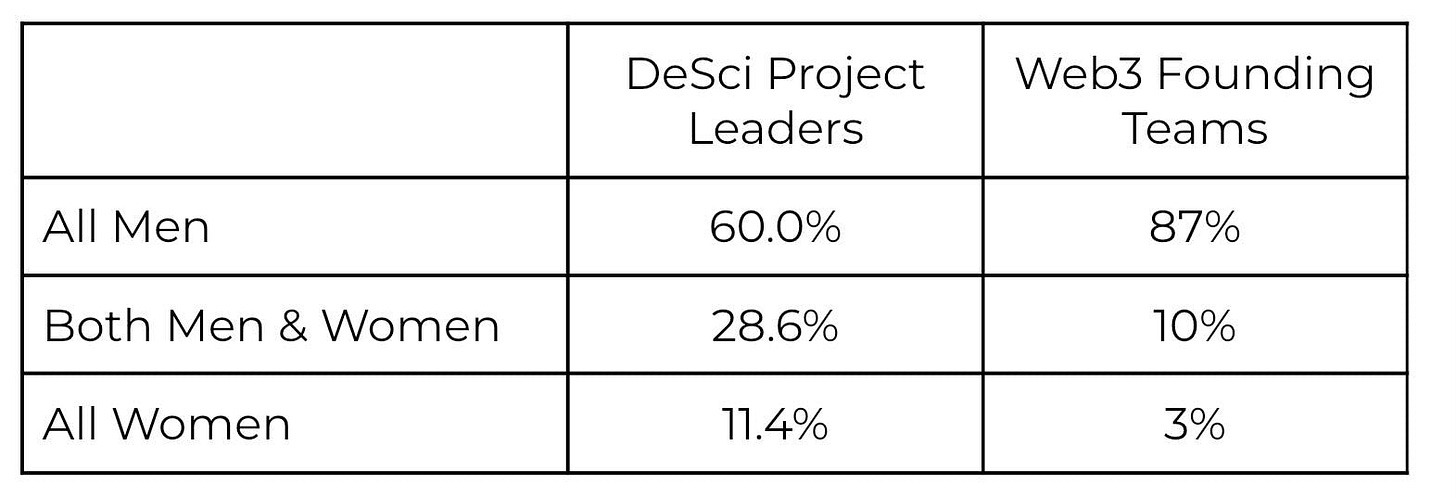In this Newsletter of Decentralized Work edition:
Our feature article: DeSci Landscape Analysis
Elsewhere in Web3
Before getting into that, we would like to invite you to participate in a TalentDAO study about motivational factors in the DAO ecosystem! If you are interested in contributing to this research, please complete this survey.
DeSci Landscape Analysis: Exploring Crowdfunding Effects On Project Development
By Erin Magennis, Francisco Diaz, and Carolina Menchaca
The results of a survey from talentDAO and DeSciWorld shed light on the impact Gitcoin Round 15 crowdfunding can have on decentralized science (DeSci) organizations and ecosystem development. We explored what these projects are and what they achieved using the funds received. This is the first phase of the DeSci Landscape Analysis, which aims to understand what the decentralized science movement is and what impact it has on the scientific ecosystem.
Decentralized science or DeSci is an expanding movement in the web3 space that explores how blockchain-based solutions can improve scientific research pain points such as publishing and funding. This movement shares energy with open science’s principles and practices aiming to make scientific knowledge more accessible, inclusive, equitable, and sustainable. Ignited when a group of scientists, builders, and crypto enthusiasts started the paradigm-shifting exploration of decentralized funding channels like DAOs (decentralized autonomous organizations), science NFTs, token launches, and crowdfunding. Due to the early nature of the ecosystem, many definitions continue to evolve, including if distributed ledger technology is an essential component to be considered a DeSci project. More resources to explore this discussion and information about DeSci projects can be found at the end of this report.
A few issues that decentralized science aims to address in traditional science is funding and decision making. Currently the majority of scientific funding decisions come from small, centralized, or governmental sources where known biases are at play (ex. preferences for known labs, men led projects, or politically aligned projects). This results in many scientific domains being underfunded, especially more disruptive research investigations. This small group approach doesn’t allow broader communities to participate such as those directly affected by the research. Taking a decentralized approach can help achieve this.
The Gitcoin Grants Program is an initiative run by Gitcoin DAO for public goods funding in the crypto space. Through its platform, the community has the opportunity to show direct support to the projects by donating funds that will be matched to that of a particular pool of partner funds. Matched amounts follow quadratic funding distribution mechanisms, which means the number of contributions matters more than the amount funded.
In September 2022, Gitcoin held a DeSci featured case round (GR15). This resulted in $568k USD being allocated to 82 projects in the ecosystem. This influx of support resulted in many DeSci projects being able to take their next step forward. This report covers 41 of the 82 Gitcoin Round 15 DeSci projects that responded to a survey focused on their accomplishments, barriers, needs, resources, funding, and demographics.
An overview of the survey
We asked 21 questions covering identifiers such as project purpose, associations, team composition and accomplishment perceptions. We also asked open questions that allowed respondents to give more detail about their needs, the barriers they face and what have they accomplished thanks to the GR15 round.
To analyze the information from the open questions, we used inductive content analysis coding, which is an exploratory methodology that allows themes to emerge directly from the data. We identified these themes and then categorized participant responses based on a selected list themes to be used as analytical codes. We had a threshold for each theme, such that at least 9 responses had to be present for a theme to be considered. The summarized count can be seen below:
Table 1: Identified Themes from Qualitative Questions. *This theme didn't meet the threshold but we wanted to show it here **Question with a lower threshold for themes because it had fewer responses
DeSci projects had accomplishments across a variety of domains
DeSci projects had accomplishments across publications, partnerships, educational efforts, participation in events, new implementations/updates, and shipped products/services. Five out of 7 of those who indicated they accomplished all of their goals participated in events. However, partnerships were more frequently achieved by projects that didn’t accomplish as many of their goals.
Figure 1: Perceived Accomplishments From Proposal *Project leaders were asked to rank on a 1-10 scale “How much were you able to accomplish of what you outlined in your GR15 project proposal? (0 nothing - 10 Everything and More)” which were grouped into approximately equal categories (80-100% accomplished n=14, 50-70% accomplished n=14, 50% or Less n=13) **Project leaders were asked to describe “What has your project accomplished since last DeSci Gitcoin round closed on September 22nd, 2022?”.
Projects efforts were focused across community building, research, funding, and technical infrastructure.
Figure 2: Project Accomplishments by Focus Area *Project leaders were asked to rank on a 1-10 scale “How much were you able to accomplish of what you outlined in your GR15 project proposal? (0 nothing - 10 Everything and More)” **Project leaders were asked “Where do you mostly focus your project’s efforts?”. They could select multiple categories across community building, research, funding, and technical infrastructure as well as enter their own response.
Notable findings:
Of the 22 projects that focused on community building, 8 participated in events but only 2 indicated they accomplished a partnership.
7/9 of the projects that accomplished educational efforts focused on community building, however only 3 focused their efforts on funding.
11/16 projects that focused on technical infrastructure had new implementations/updates or shipped products/services.
2/3 of the projects that had received other funding also focused on research.
DeSci projects need funding across the board and specific talent at different stages of project development
The needs of DeSci projects vary by project development or accomplishment level.
Figure 3: Project Needs Separated by Accomplishment Level *Project leaders were asked to rank on a 1-10 scale “How much were you able to accomplish of what you outlined in your GR15 project proposal? (0 nothing - 10 Everything and More)” **Project leaders were asked “What does your project need support with right now?”. Text response answers were grouped into 4 categories: Funding, Talent, Attraction, and Market Fit/Business Model
Projects that accomplished all of their goals need funding to get to the next level. 4 of the 6 projects that accomplished all of their proposed goals indicated funding as their only need suggesting an unmet need for investors or funding sources to level up the DeSci ecosystem and advance the sciences.
The greatest need of projects that accomplished most of their goals (scoring 8-9 out of 10), was support with a business model and market fit suggesting that as talented business professionals support projects at this stage, more projects will accomplish all of their goals.
Projects that accomplished 70% of their goals or less all indicated attraction was a primary need. This suggests that a primary focus at this stage may be community expansion and engagement.
Sponsorships played an important role in helping to fund the ecosystem so far
$587k was funneled into the DeSci ecosystem during Gitcoin Round 15, most of which came from sponsor matches determined through Gitcoin’s quadratic funding formula that weigh the number of donors more heavily than traditional sponsorship models. Due to the early nature of the DeSci ecosystem, more analysis is needed to establish stronger correlations related to funding.
Figure 4: Gitcoin Round 15 Funding Distribution *Funding data was provided by Gitcoin
Demographics of DeSci has room for improvement
Although DeSci has much greater representation compared to the broader web3 ecosystem, there is still need for improvement over gender distribution of project leaders. Currently women only led teams make up 1:6 whereas men only led teams still make up 3:5 of projects. DeSci projects with women on the core team also more frequently focused on research and community building.
Figure 5: Core Team Gender Distribution *Project leaders were asked "What do the members of your project leadership identify as?"
Table 2: Comparison of DeSci project core team and web3 ecosystem founding team gender distribution from resource linked above
DeSci can be a space for people of all ages
Media often portrays web3 as an industry dominated by younger participants. Within the DeSci ecosystem, this portrayal may not be as accurate.
Project leaders range in age from 19 to 70 year olds. This lays a stable foundation for DeSci to be a space for people of any age attracting those with more experience and those newer to the traditional scientific system.
Figure 5: Core Team Ages *Project leaders were asked "What is the age range of your project leaders?". Age ranges were plotted across youngest and oldest members
Gitcoin supported DeSci projects are currently heavily focused in North America and Europe
DeSci currently heavily focuses its efforts on North America (78%) and Europe (41%) followed by Latin America (26%), South America (17%), and Africa (12%), with all other regions being focused on by less than 10% of projects.
Figure 6: DeSci Project Focus Across the World *Project leaders were asked "Where do you mostly focus your project’s efforts?" with North America, South America, Latin America, Europe, Africa, Australia, Oceania, Southeast Asia, Middle East, India, and East Asia as options
The DeSci ecosystem is actively interested in sharing knowledge and learning from other projects in the space.
One complaint often expressed about traditional or institutional science is the lack of collaboration and the competitive nature of the space. DeSci is trending towards opposing this stance with half of the projects offering “information or resources that would help enhance the understanding of the DeSci ecosystem”. This includes repositories, insights on legal formalization or scientists’ onboarding, and educational tools like documents, videos and series of talks.
Furthermore, there is an appetite for learning from one another. Forty-two percent of projects desired future DeSci landscape analysis efforts to explore open collaboration and partnerships, hoping to see more projects working in the open and collaborating with other initiatives and how they do so.
Future DeSci Landscape Analysis efforts can expand our understanding of the evolving DeSci ecosystem
The DeSci Landscape is a budding ecosystem and as projects mature over time more pronounced trends may emerge.
This survey showed that the ecosystem indicated they wanted more transparent definitions and dialogue about what these projects are actually doing so it becomes easier to follow their work and collaborate. There’s also interest in knowing more about the demographic representation of each project (gender, age, professional background, nationality, etc.). More information about how to collaborate and receive funds is also requested, as well as asking for a way to measure DeSci’s impact. This could help create an understanding of how funding these projects really impacts the scientific landscape such as overcoming pain points slowing down traditional science.
We plan to explore these requests in further phases of this study, trying to get as many DeSci teams involved. If you are part of a decentralized team doing science, please consider collaborating with us and answering the survey we’ll share in the coming months.
Conclusion
At a high level, there are opportunities to get involved with and support DeSci that vary across the level of accomplishment a given project exhibits. DeSci is also more inclusive from an age and gender perspective than the broader web3 ecosystem and traditional science which is in alignment with decentralization ideals.
As DeSci continues to expand and evolve we expect to see more involvement and community growth. Talent is needed across the board but it varies by stage. There’s plenty of room for scientists to join DeSci projects, but also developers, lawyers, marketing experts and project managers are needed.
DeSci is in its early stages of ecosystem development with many projects being developed and the community actively growing. We believe that as it continues to evolve it can deeply influence the scientific landscape, bringing meaningful results in the coming years.
If you have an interest in working in science in a decentralized space, you should consider joining one of these teams and building together. You’ll find resources at the end of this report that will help you understand more about DeSci and how to get started.
About the Authors
Erin Magennis is a consultant and speaker serving as Chief of Staff at talentDAO. She has a background in neuroscience, operations, and innovation strategy.
Francisco Díaz is a core member and researcher at talentDAO. MSc candidate in Applied Social Systems Analysis. Has studied leadership and DEI practices in DAOs.
Carolina Menchaca is a biologist with an MSc in Ecology and Evolution. She is a core team member of DeSciWorld and a researcher at Yaqu Pacha Uruguay
Resources
Awesome-DeSci: A curated list of awesome decentralized science (DeSci) resources, projects, articles and more. https://github.com/DeSciWorldDAO/awesome-desci
DeSciWorld Dashboard: A free-to-use online information hub that aggregates and displays information about DeSci projects https://desci.world/dashboard
DeSci.Global: A calendar of upcoming and past decentralized science events.
Distributed Ledger Technology for Open Scientists https://thesciencecommons.substack.com/p/distributed-ledger-technology-for
Implementing DeSci in Web3 Development: A Guide for Builders https://hackernoon.com/implementing-desci-in-web3-development-a-guide-for-builders
Could blockchain unblock science? https://www.nature.com/nature-index/news-blog/could-blockchain-unblock-science
A Guide to DeSci, the Latest Web3 Movement https://a16zcrypto.com/posts/article/what-is-decentralized-science-aka-desci/
Decentralized science (DeSci) https://ethereum.org/en/desci/
Catalyzing a Movement with Gitcoin Grants https://www.gitcoin.co/blog/catalyzing-a-movement-with-gitcoin-grants
Quadratic Voting: How Mechanism Design Can Radicalize Democracy https://papers.ssrn.com/sol3/papers.cfm?abstract_id=2003531
Elsewhere in Web3
This section includes summaries of articles that members of the TalentDAO community found interesting and wanted to share.
Inclusive Participation in Dynamic Communities: Fostering Equity and Value Creation for All Members
Web3 technologies and dynamic governance models offer exciting possibilities for creating inclusive and equitable online communities. Prioritizing inclusive participation, transparent decision-making, and valuing all members' contributions is crucial for empowering individuals and fostering meaningful connections. Acknowledging and celebrating the contributions of non-circle role members can create a culture of appreciation. Adapting to changing needs ensures long-term success and relevance. By staying responsive, committed to equity, and embracing new opportunities, online communities can shape a more connected, collaborative, and empowering future for all members. (full text)
Rethinking Legitimacy in DAOs
Legitimacy is essential for the success of any organization. Traditional methods of DAO governance, like coin voting and delegates, have shown weaknesses in maintaining legitimacy due to issues like token concentration and voter apathy. Multistakeholder governance offers a promising alternative, drawing inspiration from political systems and corporate boards, where different groups of stakeholders have a say in decision-making. By distributing voting power among operators, consumers, and producers, multistakeholder governance ensures representation and minority protection. It provides flexibility in consensus mechanisms for each stakeholder group and offers a balanced approach to achieve true decentralization and legitimacy in DAOs, ultimately empowering members and fostering collective ownership. (full text)
An Introduction to: “Governance as Conflict: Constitution of Shared Values Defining Future Margins of Disagreement”
This article explores a research paper by Eric Alston on governance in organizations, focusing on DAOs. Conflict is inevitable in organizations due to diverse member preferences. To manage conflict, organizations use ex-ante (preventing conflict) and ex-post (resolving conflict) design levers. Examples of ex-ante levers include constitution scope and subsidiarity, while courts and rights, as well as automation, are ex-post levers. DAO designers face challenges in creating innovative structures to mitigate conflict and leveraging technology for dispute resolution. Reducing conflict can enhance the efficiency of democratized decision-making in DAOs and give them a competitive edge over traditional organizations. (full text)
Academics Assist in DAO Role Analysis
Understanding how to fairly compensate roles within DAOs can be challenging. To address this, a team of Master's degree students analyzed BanklessDAO, offering recommendations to improve compensation. They suggested reconfiguring bounty payments based on task difficulty and significance, establishing a compensation committee, and differentiating pay for full-time and part-time contributors. Additionally, they advised adjusting compensation rates based on the market value of the cryptocurrency token used for compensation. Feedback on the study highlighted that the analysis was not holistic enough and focused on individual elements rather than a comprehensive view of the DAO. Nonetheless, the study served as a beneficial exercise for the organization, offering potential room for growth and improvement in the future. (full text)
Simulating Token Economies: Motivations and Insights
6th Man Ventures developed Agent-Based models to analyze token economies like Filecoin and Chainlink. They found that token design decisions can mitigate downward price pressure in bear markets, and incentivizing providers is more efficient than incentivizing users. Token emission rates didn't significantly affect protocol performance, so they recommend prioritizing value drivers. Increasing staking rewards raised token market cap but also increased volatility. While market trends influenced token prices, smart token design can stabilize prices during volatile markets. They also studied the effects of user and provider adoption and varying staking rates. The models are useful but have limitations, and future publications will explore more economic scenarios. They're optimistic about refining token mechanisms to create stable and successful economies. (full text)

















Hell yeah. Decentralized systems are how we return the power to the people.
Everyone needs to understand The Last Hand on The Bat theory of decentralized systems. Once that is grasped we can build quickly. This article is "Embrace Decentralized Systems. Fear Centralized Ones. Know The Difference."
https://joshketry.substack.com/p/embrace-decentralized-systems-fear
Keep up the good work!
Great